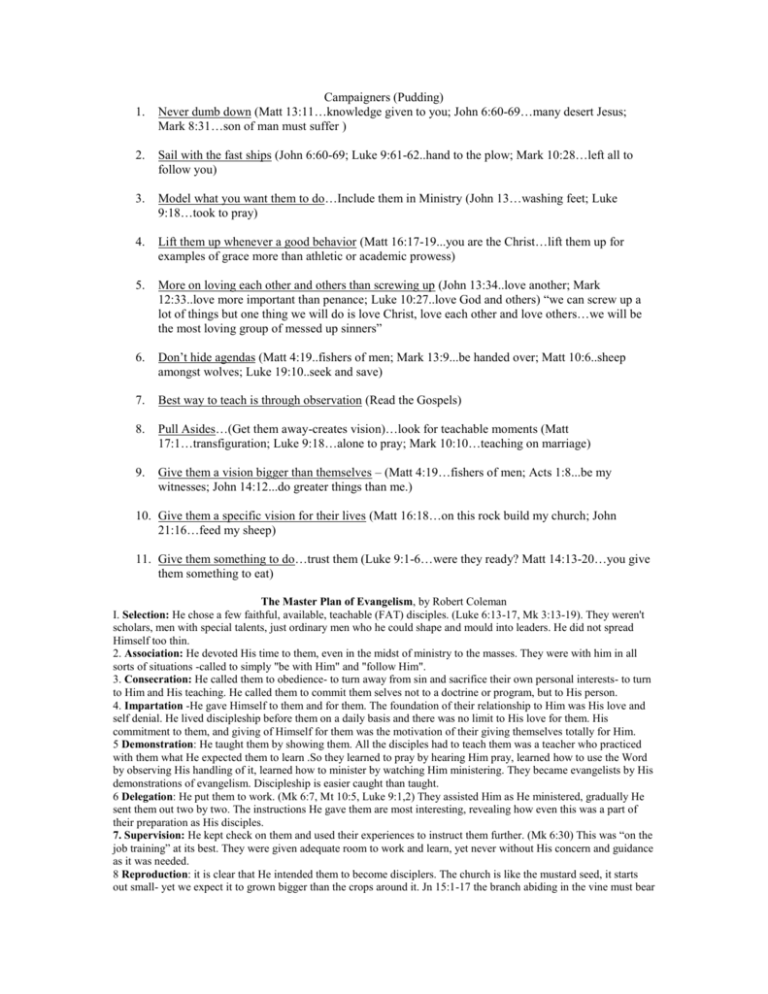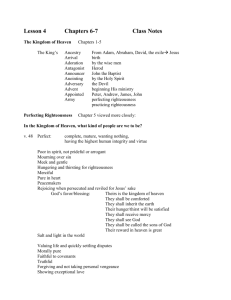Campaigners (Pudding) - Greater Cincinnati Urban
advertisement

1. Campaigners (Pudding) Never dumb down (Matt 13:11…knowledge given to you; John 6:60-69…many desert Jesus; Mark 8:31…son of man must suffer ) 2. Sail with the fast ships (John 6:60-69; Luke 9:61-62..hand to the plow; Mark 10:28…left all to follow you) 3. Model what you want them to do…Include them in Ministry (John 13…washing feet; Luke 9:18…took to pray) 4. Lift them up whenever a good behavior (Matt 16:17-19...you are the Christ…lift them up for examples of grace more than athletic or academic prowess) 5. More on loving each other and others than screwing up (John 13:34..love another; Mark 12:33..love more important than penance; Luke 10:27..love God and others) “we can screw up a lot of things but one thing we will do is love Christ, love each other and love others…we will be the most loving group of messed up sinners” 6. Don’t hide agendas (Matt 4:19..fishers of men; Mark 13:9...be handed over; Matt 10:6..sheep amongst wolves; Luke 19:10..seek and save) 7. Best way to teach is through observation (Read the Gospels) 8. Pull Asides…(Get them away-creates vision)…look for teachable moments (Matt 17:1…transfiguration; Luke 9:18…alone to pray; Mark 10:10…teaching on marriage) 9. Give them a vision bigger than themselves – (Matt 4:19…fishers of men; Acts 1:8...be my witnesses; John 14:12...do greater things than me.) 10. Give them a specific vision for their lives (Matt 16:18…on this rock build my church; John 21:16…feed my sheep) 11. Give them something to do…trust them (Luke 9:1-6…were they ready? Matt 14:13-20…you give them something to eat) The Master Plan of Evangelism, by Robert Coleman I. Selection: He chose a few faithful, available, teachable (FAT) disciples. (Luke 6:13-17, Mk 3:13-19). They weren't scholars, men with special talents, just ordinary men who he could shape and mould into leaders. He did not spread Himself too thin. 2. Association: He devoted His time to them, even in the midst of ministry to the masses. They were with him in all sorts of situations -called to simply "be with Him" and "follow Him". 3. Consecration: He called them to obedience- to turn away from sin and sacrifice their own personal interests- to turn to Him and His teaching. He called them to commit them selves not to a doctrine or program, but to His person. 4. Impartation -He gave Himself to them and for them. The foundation of their relationship to Him was His love and self denial. He lived discipleship before them on a daily basis and there was no limit to His love for them. His commitment to them, and giving of Himself for them was the motivation of their giving themselves totally for Him. 5 Demonstration: He taught them by showing them. All the disciples had to teach them was a teacher who practiced with them what He expected them to learn .So they learned to pray by hearing Him pray, learned how to use the Word by observing His handling of it, learned how to minister by watching Him ministering. They became evangelists by His demonstrations of evangelism. Discipleship is easier caught than taught. 6 Delegation: He put them to work. (Mk 6:7, Mt 10:5, Luke 9:1,2) They assisted Him as He ministered, gradually He sent them out two by two. The instructions He gave them are most interesting, revealing how even this was a part of their preparation as His disciples. 7. Supervision: He kept check on them and used their experiences to instruct them further. (Mk 6:30) This was “on the job training” at its best. They were given adequate room to work and learn, yet never without His concern and guidance as it was needed. 8 Reproduction: it is clear that He intended them to become disciplers. The church is like the mustard seed, it starts out small- yet we expect it to grown bigger than the crops around it. Jn 15:1-17 the branch abiding in the vine must bear











